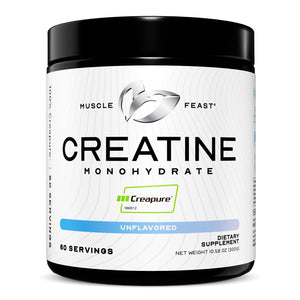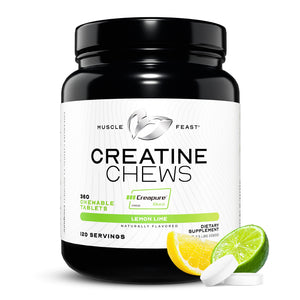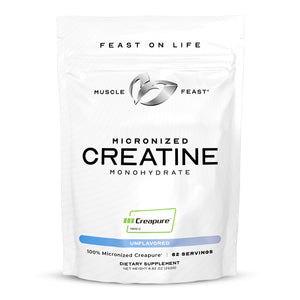The brain makes up only about 2% of total body mass, yet it consumes nearly 20% of the body’s resting energy. This constant demand for energy means that even small disruptions in metabolism can impact cognition, mood, and resilience. One of the body’s natural defenses is the creatine–phosphocreatine (PCr) system, which helps buffer ATP which is the molecule that fuels all cellular activity.
For decades, research on creatine has focused on skeletal muscle, where supplementation clearly improves strength, power, and recovery. More recently, attention has turned to the brain. Here, the story is more nuanced: creatine does not act as a universal “brain booster,” but instead shows its greatest promise when the brain is under stress such as during sleep deprivation, trauma, or mood disorders.
Brain Creatine Metabolism & Uptake
Creatine is produced in the body from amino acids (arginine, glycine, and methionine) and obtained from diet. While skeletal muscle stores creatine at high concentrations (35–40 mM), the brain holds far less (4–6 mM). This difference is due to the blood–brain barrier, which regulates entry through the CT1 transporter. Because this transporter is saturable and tightly controlled, creatine levels in the brain only rise modestly with supplementation.
Studies using brain imaging show increases of about 3–10% in response to creatine loading. While that seems small compared to muscle, such increases are significant in the brain, where energy stability is critical. High-dose strategies (around 20 g/day for several weeks) appear to be most effective, and researchers are exploring whether precursors like guanidinoacetic acid (GAA) or analogs like cyclocreatine could provide alternative ways to raise brain creatine.

Creatine and Cognitive Function
The strongest evidence for creatine’s importance in cognition comes from rare genetic disorders where creatine transport or synthesis is impaired. In these cases, supplementation can reverse severe cognitive deficits highlighting how essential creatine is to brain function.
In healthy adults, the story is less clear. Many studies show no effect on memory or executive function in young, well-nourished populations. But in situations where the brain is under greater strain, the results are more promising. Vegetarians and vegans, who typically have lower baseline creatine levels, often benefit more from supplementation. Older adults, who experience age-related declines in energy metabolism, may also see improvements. And when people are sleep deprived, hypoxic, or mentally fatigued, creatine appears to help sustain working memory, reaction time, and mental sharpness.
Creatine and Mental Health
Emerging evidence links creatine to mood regulation. Brain imaging studies suggest that low creatine levels, especially in the prefrontal cortex, are associated with depression severity. This has led researchers to test creatine as an add-on to antidepressant therapy.
Small clinical trials show encouraging results. In one study, women taking 5 g/day of creatine alongside an SSRI experienced greater symptom improvement than those on the antidepressant alone. High-dose creatine has also been shown to raise brain creatine by nearly 9% in healthy adults, supporting its biological plausibility. Early case reports hint that creatine may also ease symptoms of post-traumatic stress disorder (PTSD) and anxiety, though much more research is needed.
Proposed mechanisms include improved energy buffering in neurons, modulation of neurotransmitters, and stimulation of brain-derived neurotrophic factor (BDNF), a protein that supports neural plasticity and resilience.

Creatine for Neurodegenerative Diseases
Creatine has long been studied for its potential to slow diseases like ALS, Huntington’s, Parkinson’s, and multiple sclerosis (MS). The rationale is clear: these conditions involve mitochondrial dysfunction, oxidative stress, and energy failure all processes creatine could theoretically stabilize.
Unfortunately, large clinical trials have been disappointing. While some early studies hinted at benefits in ALS or Huntington’s disease, later work showed little to no measurable effect. In Parkinson’s, encouraging results in animal studies did not translate to human trials. For MS, the research remains sparse, with no strong evidence of efficacy.
An exception is muscular dystrophy. Here, creatine supplementation consistently improves muscle strength and lean mass, supporting its use as part of a comprehensive therapy.
Creatine for Traumatic Brain Injury (TBI)
Among all areas of research, TBI provides the strongest clinical case for creatine in brain health. Injury disrupts creatine and ATP metabolism, leaving neurons vulnerable to damage. Supplementation appears to counteract this energy crisis.
In animal models, creatine supplementation reduced cortical damage by up to 50%, preserved mitochondrial function, and protected neurons from excitotoxicity. In humans, early trials in children and adolescents with TBI showed that creatine supplementation accelerated recovery, reduced amnesia, and lessened lingering symptoms like fatigue and dizziness.
While larger and more rigorous studies are needed, the consistency between animal and human findings makes TBI one of the most compelling targets for creatine in clinical practice.
Consensus & Future Directions
Across the major reviews, a clear picture emerges:
-
Brain creatine increases modestly with supplementation, far less than in muscle.
-
Strongest benefits: TBI recovery, cognition under stress (sleep loss, fatigue), adjunct treatment in depression, and strength outcomes in muscular dystrophy.
-
Weakest evidence: Alzheimer’s, Parkinson’s, ALS, MS, and routine cognitive enhancement in healthy, rested adults.
-
Next steps: refining dosing strategies, exploring differences across age and sex, and testing precursors like GAA to bypass transport limits.
Conclusion
Creatine is best understood not as a cognitive enhancer for healthy individuals, but as a neuroenergetic buffer that protects and supports the brain under stress. The most compelling evidence lies in TBI recovery, mood disorders, and resilience to fatigue or sleep deprivation. While trials in neurodegenerative diseases remain disappointing, creatine’s safety, affordability, and proven role in muscle health make it an exciting candidate for broader use in brain health.
As research evolves, creatine may emerge as one of the simplest and most accessible ways to help the brain sustain energy, resilience, and recovery when it needs it most.
- Conrad RN
References
Roschel, H., Gualano, B., Ostojic, S. M., & Rawson, E. S. (2021). Creatine supplementation and brain health. Nutrients, 13(2), 586. https://doi.org/10.3390/nu13020586
Forbes, S. C., Cordingley, D. M., Cornish, S. M., Gualano, B., Roschel, H., Ostojic, S. M., Rawson, E. S., Roy, B. D., Prokopidis, K., Giannos, P., & Candow, D. G. (2022). Effects of creatine supplementation on brain function and health. Nutrients, 14(5), 921. https://doi.org/10.3390/nu14050921
Candow, D. G., Forbes, S. C., Ostojic, S. M., Prokopidis, K., Stock, M. S., Harmon, K. K., & Faulkner, P. (2023). “Heads Up” for creatine supplementation and its potential applications for brain health and function. Sports Medicine, 53(Suppl 1), S49–S65. https://doi.org/10.1007/s40279-023-01870-9



